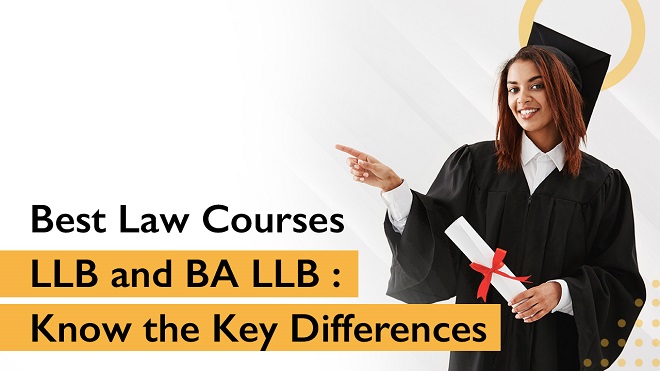Best Law Courses LLB And BA LLB: Know The Key Differences

Do you know that more than 5 lakh students are pursuing law education in India?
Students of the current generation are showing greater interest in conserving the legal system and justice in India. As an outcome, a huge number of students are opting for law education at the best LLB colleges in Delhi NCR and other places.
If you are a student interested in making a career in law, but confused about whether to start immediately after 12th or after UG, then read this article to find which is best for you.
Law Education after 12th:
Persistency is the key to success when it comes to law education.
If you have completed 12th and have a strong notion to have law as your career, then you can immediately opt for law-integrated courses after 12th.
One of the best law-integrated UG courses after the 12th is BA LLB, i.e., Bachelor of Arts along with Bachelor of Legal Legislative.
Here are the course details.
Course Description:
BA LLB is an undergraduate course that incorporates both arts and law education. This course is offered in many top colleges such as HIMT Group of Institutions, one of the best BA LLB colleges in Noida.
For Integrated LLB degrees such as BA LLB, the course duration is 5 years as it involves one UG stream along with the LLB stream. In BA LLB, the first few semesters concentrated on the UG stream and the rest included law education.
Eligibility Criteria:
The basic eligibility criteria required to pursue a BA LLB at the best BA LLB colleges in Delhi NCR are as follows.
- Candidates should have completed 10+2 or equivalent from any recognized educational institution.
- The minimum percentage required for Integrated LLB is 45% aggregate marks for the general/OBC category and 40% aggregate marks for the SC/ST category.
Admission Procedure:
Admission to BA LLB courses is offered majorly based on the candidates’ score in the 10+2 examination while certain colleges conduct their entrance examinations for student recruitment.
Law Education after a UG degree:
If the student has already graduated with a UG degree, yet feels like starting their law education, then yes, you can do that. Opt for an LLB degree which can be pursued after any UG degree.
LLB courses are offered at the best law colleges in Greater Noida and other places. Here are the course details.
Course Description:
LLB is an undergraduate law course that exclusively educates and trains students in the law and legal systems. This course is offered at the best LLB colleges in Delhi NCR.
The course duration of the LLB degree is 3 years and offers dedicated law education to students.
Eligibility Criteria:
The basic eligibility criteria required to pursue LLB at renowned colleges in Noida offering LLB are as follows.
- Candidates should have been graduates at least with a UG degree from any recognized educational institution.
- The minimum percentage required for LLB after graduation is 45% aggregate in general while 5% relaxation is offered to SC/ST graduates.
Admission Procedure:
Admission to LLB courses can be gained by students by cracking law entrance exams such as the AILET – All India Law Entrance Test. Certain colleges also provide LLB admission based on the candidates’ UG scores.
With an introduction to both LLB and BA LLB courses, let us explore the key differences between them.
Major Differences between LLB and BA LLB:
There are notable differences between LLB and BA LLB which are listed below.
| Criteria | LLB | BA LLB |
| Degree Structure | It is a standalone law degree that focuses exclusively on legal studies | It combines legal education with a broader foundation in the arts, incorporating subjects from the field of humanities, social sciences, or liberal arts along with law courses. |
| Curriculum | The curriculum is predominantly law-oriented, covering subjects such as constitutional law, criminal law, contract law, and more. | In addition to law subjects, students also study arts-related courses, which may include languages, history, political science, sociology, etc. This combination provides a more holistic education. |
| Duration | Typically a three-year program in many countries. | The duration can vary, but it is often a five-year program that combines both legal and arts courses. |
| Interdisciplinary Approach | Focuses solely on legal principles, theories, and applications. | Offers an interdisciplinary approach, integrating legal studies with insights from other disciplines. This can provide a broader perspective on the law and its societal context. |
| Career Opportunities | Graduates often pursue careers directly related to law, such as becoming lawyers, legal advisors, or judges. | Offers a wider range of career options due to the additional skills acquired in the arts field. Graduates may find opportunities in legal practice as well as in areas that benefit from a combination of legal and humanities/social science knowledge. |
| Skills | Emphasis on legal skills, analytical thinking, and understanding of legal principles. | Develops a broader skill set, including critical thinking, communication skills, and an understanding of societal issues in addition to legal skills. |
| Professional Recognition | LLB graduates are professionally recognised as strong law professionals such as lawyers. | BA LLB graduates even with a law education, are considered inferior to LLB graduates |
These are the key differences you must know before opting for your law course. Consider your career requirements, interest in law and other factors while choosing your law course. Also, look for the best colleges in Noida and other places that offer the best law courses to sharpen and shine bright in a law career.
Conclusion:
Ensure that you understand the major differences between LLB and BA LLB that will create differences in your career path in the law arena before opting for law education at the best LLB colleges in Noida. All the best for future lawyers.
FAQs:
1) Can students do LLB after the 12th without graduation?
No, students cannot do LLB without graduation after the 12th. Instead, they can pursue an integrated LLB degree.
2) What are the skills required to pursue an LLB?
- Commercial awareness
- Time management
- Academic potential
- Legal research and analysis
- Self-confidence and resilience
- Eye for detail
- Communication skills
3) What is the higher education option after LLB?
LLB graduates can pursue a Master of Legislative Law (LLM) in legal education. They can also pursue
- MBA
- MA
- Phil
- MBL
4) Which 12th stream is best for LLB?
The commerce stream is the best in 12th to pursue LLB. But candidates for all streams such as science, arts, etc, can pursue LLB.




